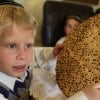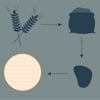We are all royalty on the Seder night, dressed in our finest clothes and seated around tables bedecked with our most impressive tableware. We pour four cups of sparkling wine, which we drink while reclining. And of course, to celebrate Passover, the “Festival of Our Freedom,” we partake of matzah, the bread of . . . poverty?
For thus the Torah describes the matzah: “Seven days you shall consume matzah, the bread of poverty, for in haste you left Egypt . . .” How did this poor bread wangle center stage in our festival of liberty, the time of our national birth and our acquisition of the greatest of wealths—our freedom?
Abraham, at the “Covenant Between the Parts,” was foretold three stages to the future Egyptian saga which would befall his descendants. G‑d first informed Abraham of the slavery: “They will enslave them and afflict them.” Second, he was told of their tormentors’ punishment and destruction: “I will bring judgments upon the nation that afflicts them.” Third, he was guaranteed the actual Exodus from Egypt: “After that they shall leave . . .” (Genesis 15:12–14).
Our sages explain that the three foods we are commanded to consume on Passover correspond to these same three stages. The bitter herbs reflect our ancestors’ suffering, the Paschal lamb was offered to commemorate G‑d’s protection as He punished our Egyptian masters, and the matzah represents our hasty and total exit from the land of Egypt—our freedom.
So, why does the Torah describe this bread of freedom as the “bread of poverty”?
Indeed, writes Maharal of Prague (Rabbi Judah Lowe, 1525–1609), the Torah is skillfully highlighting the true meaning of freedom. Freedom means the liberation from dependency on matters or forces that are external to our true selves and goals. True freedom allows the self to shine forth unhindered.
A gourmet bread containing oil or honey, a cake with nuts and fruits, or a challah with eggs and poppy seeds, cannot represent freedom. They are flavored by external ingredients that override their most basic materials. Matzah, lacking such extra ingredients, symbolizes the most pure and true self, a self not enslaved by foreign influences.
The Jews in Egypt had been molded into slaves, with the mindset and all else that accompanies two hundred and ten years of exile and harsh labor. They had likewise absorbed and become part of the Egyptian culture and practice. To be free, to become a nation unto themselves, they had to shake off their dependency, the mindsets and customs of the nation of Pharaohs. All the way down to their basic flour and water.
The matzah was a message that the past two hundred years of conduct and dependency were truly slavery. To become free men, the Jews had to be independent from foreign culture and servitude. Their only dependency was to G‑d, of whose fire their own souls—and therefore, their true selves—were actual flames.
This message rings true throughout history, and still guides us today. On the national level, an Israel free of American or European dependency is a freer Israel, able to conduct herself in accordance with her own history and destiny. An America free of dependency on foreign oil is a freer America, able to pursue the principles upon which it was founded. On a personal level, too, a person who can bring themselves to forgo their TV on Saturday is no longer enslaved to it. They may seem to be consuming the bread of “poverty,” by depriving themselves of certain “extras,” yet they have actually found the bread of freedom.
The person who can overcome negative social or internal pressures and align his life with his soul’s purpose has freed his true self and given it expression.
Each year we have a festival of true freedom, to search out and negate negative and external influences, and to refresh our sense of who we truly are.








Join the Discussion